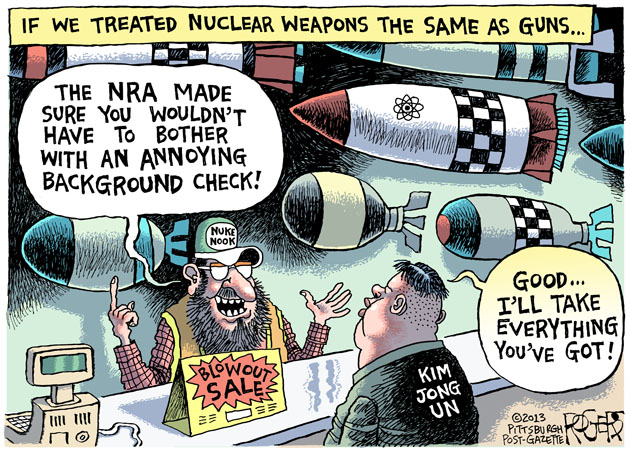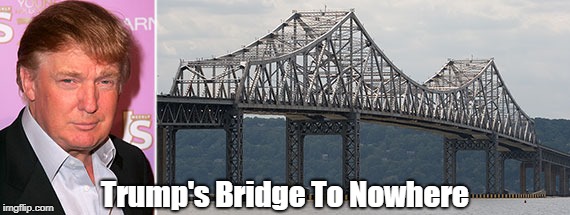
The US Is Being Played By Pyongyang ... Again
By Bret Stephens
Kim Jong Un has a peace bridge he'd like to sell you.
His grandfather, Kim Il-sung, sold that bridge to Bill Clinton in 1994, promising to shut down a reactor designed to produce plutonium for bombs in exchange for oil supplies, a pair of "proliferation-resistant" reactors, and an easing of trade restrictions.
The deal, known as the Agreed Framework, "will make the United States, the Korean Peninsula, and the world safer," Clinton promised. "It does not rely on trust. Compliance will be certified by the International Atomic Energy Agency."
In 2002, North Korean negotiators admitted to pursuing a secret uranium-enrichment program. The Framework collapsed.
Six years after that, Kim's father, Kim Jong-il, sold the same bridge to George W. Bush. In exchange for relief from US sanctions, North Korea promised to declare its nuclear activities, disable its reactor, and allow international inspections.


"The policy of the United States is a Korean Peninsula free of all nuclear weapons," Bush said in a statement. "This morning we moved a step closer to that goal when North Korean officials submitted a declaration of their nuclear programs."
It soon became clear that the North's declaration was incomplete. Pyongyang evicted inspectors the following April and conducted a nuclear test the next month.
Now it's Kim's turn to play the game of escalate-and-conciliate/cheat-and-repeat. Judging from Friday's brilliantly orchestrated summit meeting with South Korean President Moon Jae-in in the village of Panmunjom, the young leader may be his family's most adept player yet.
We've already seen the escalation: the frequent missile tests, the unveiling of what is supposed to be a hydrogen bomb, the detonation of a high-yield device. Then came the dramatic rapprochement: first at the Winter Olympics; next with the announcement of a summit with Donald Trump; now with the theatrics at the DMZ.
What's mostly stunning about all this is the predictability of the choreography – and the way we seem to fall for it every time. Part of this is quite natural: War is a catastrophic option and China is never going to force Pyongyang to denuclearise.
Other alternatives? Last July, I asked then-CIA Director Mike Pompeo to suggest some. "From the administration's perspective," he replied, "the most important thing we can do is ... separate capacity, and someone who might well have intent, and break those two apart."
It was an unmistakable call for regime change, and Pompeo promised that the intelligence community would provide "a wide range of options for the president about how we might go about that." Apparently they came up short. Hence the interest in negotiation.
Yet the fact that all the options are bad does not, as some argue, make negotiations the "least bad" among them. Sanctions relief and economic concessions help keep the Kim regime in power and in business, funding the nuclear programs those concessions are supposed to stop.
Negotiations also dignify and legitimise a regime that, alongside Syria's Bashar Assad, is the worst violator of human rights in the world today. Spare a thought, while watching the two Korean presidents behave like old friends, for the 80,000 to 130,000 prisoners enslaved in Pyongyang's gulags.
Worst of all, the negotiations will tempt Trump to indulge his worst isolationist impulses. Last month, he again hinted that he would withdraw US troops from South Korea if he doesn't get better trading terms. That would have been music to Kim's ear, since a fundamental goal of North Korean policy is to drive a wedge between Seoul and Washington.
A peace deal between the United States and North Korea to establish formal relations and end the Korean War would be hailed, even by many liberals, as a signal diplomatic triumph. Fox News would clamour for Trump to be awarded a Nobel Peace Prize. But it would advance a central aim of North Korean and Chinese foreign policy by undercutting the rationale for maintaining sizeable US forces in South Korea.
That might be a worthwhile price to pay in exchange for the complete, verifiable and irreversible denuclearisation of the North. But as The Washington Post's Richard Cohen aptly noted the other day, "North Korea without a nuclear arsenal is like Saudi Arabia without oil." It isn't going to happen unless Kim has lost his taste for power or gained a sense of remorse. That wasn't the confident young dictator who stepped into South Korea yesterday.
It will be interesting to see how these considerations affect Trump, who shares Kim's love for the dramatic twist. It will be equally interesting to watch national security adviser John Bolton, who has spent years warning against just the kind of deal the president may be tempted to sign. "Abandon all principle, ye who enter here," should be the sign posted over the West Wing door.
But it will be tragic to watch another administration being played by Pyongyang. Better advice for the White House: If you have no good options, stick to the status quo. It's served us well enough for 65 years.
Bret Stephens is a New York Times columnist
The New York Times
No comments:
Post a Comment